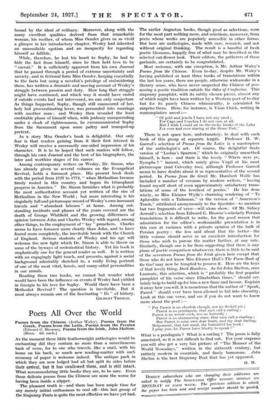Poets All Over the World
Poems from the Chinese (Arthur Waley), Poems from the Greek, Poems from the Latin, Poems from the Persian (Edward G. Browne), Poems from the Irish, John Skelton. (Benn. 6d. each.) AT the moment these little featherweight anthologies would be enchanting did they contain no more than a miscellaneous hash of verse, for to one who travels, like a snail, with his home on his back, so much new reading-matter with such economy of paper is welcome indeed. The antique pack in which they are now lodged had all but split its sides before their arrival, but it has swallowed them, and is still intact. What accommodating little books they are, to be sure. Even those delicate poems from the Chinese are none the worse for
having been inside a slipper.
The pleasant truth is—and there has been ample time for any merely initial enthusiasm to cool off—this last group of the Sixpenny Poets is quite the most effective we have yet had.
The earlier Augustan books, though good as selections, were for the most part nothing more, and selections, moreover, from
poets whose works are popularly accessible in other forms. But here are anthologies, made with care, research, and not without original thinking. The result is a handful of fresh poetic blossoms, happily free of what may be described as the selected cut-flower look. Their editors, the gatherers of these garlands, are certainly to be congratulated.
Most welcome, with one exception, is Mr. Arthur Waley's Poems from the Chinese. Even to-day, despite Mr. Waley's having published at least three books of translations within the last ten years, there are people, otherwise wideawake in a literary sense, who have never suspected the Chinese of pos- sessing a poetic tradition outside the Odes of Confucius. This sixpenny pamphlet, with its subtly chosen pieces, almost any of which might have been written by a Western poet of to-day but for its purely Chinese whimsicality, is calculated to surprise them. Here, for instance, is Yuan Chieh, writing in contemplative mood :—
" Of gold and jewels I have not any need ; For Caps and Coaches I do not care at all. But I wish I could sit on the rocky banks of the Lake For ever and ever staring at the Stone Fish."
There is not space here, unfortunately, to deal with each book of this group at separate length. Professor H. W. Garrod's selection of Poems from the Latin is a masterpiece of the anthologist's art. Of course, the delightful Scots version of "Lesbia's Sparrow," which he originally unearthed himself, is here : and there is the lovely " Where were ye, Nymphs ? " lament, which surely gives Virgil at his most picturesque (and Calverley too), although Professor Garrod seems to have doubts about it as representative of the second period. In Poems from the Greek Mr. Humbert Wolfe has included a number of versions by modern writers, " having found myself short of even approximately satisfactory trans- lations of some of the loveliest of poems." He has done wisely, as Miss Eleanor Wylie's charming rendering of " To Aphrodite with a Talisman," or the version of " Anacreon's Tomb," attributed anonymously to the Spectator—to mention but two fragments of verse—will alone show. Of Mr. Sidney Jerrold's selection from Edward G. Browne's scholarly Persian translations it is difficult to write, for the good reason that admiration for the editor's workmanlike presentation is in this case at variance with a private opinion of the bulk of Persian poetry : the less said about that the better—the little volume should serve as an excellent introduction for those who wish to pursue the matter further, at any rate. Similarly, though one is far from suggesting that there is any plane of poetic comparison whatsoever, there is little to be said of the seventeen Poems from the Irish given here except that those who do not know Miss Eleanor Hull's The Poem-Book of the Gael may now be tempted to possess it. Here are the keys of that lovely thing, Dark Rosaleen. As for John Skelton, once Laureate, this selection, which is " probably the first popular pamphlet of his verse since Elizabethan times," should cer- tainly help to build up for him a new fame and favour. Explain it away how you will, it is monstrous that the author of " Speak, Parrot should ever have been allowed to fall into obscurity. Look at this one verse, and see if you do not want to know more about the poet :-
" For Parrot is no churlish chough, nor no flecked pie ; Parrot is no pcnduguin, that men call a calling : Parrot is no woods-cock, nor no butterfly ;
Parrot is no stammering stare, that men call a starling ; But Parrot is mine own dear heart, and my dear darling. Melpomene, that fair maid, she burnished his beak : I pray you, let Parrot have liberty to speak !"
What is a penduguin ? What is a carting ? The poem is fully annotated, so it is not difficult to find out. For your sixpence you will also get a very fair picture of " The Manner of the World Nowadays," written in the sixteenth century, but entirely modern in essentials, and finely humorous. John Skelton is the best Sixpenny Poet that has yet appeared.
II. M.










































 Previous page
Previous page